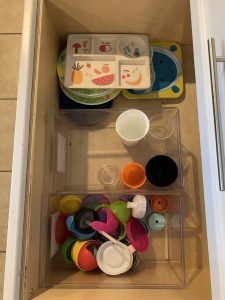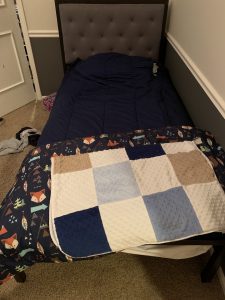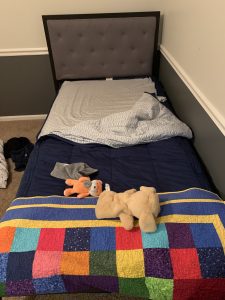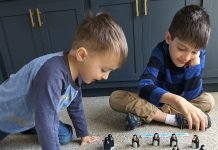I have a habit I am trying to change — punishing myself while holding my kids accountable for undesirable behavior. Do any of the following sound familiar?
- “Hit him again, and you are going to your room for the rest of the night!” (… at 4 p.m.)
- “If you take out one more toy, I am throwing them all away!” (… I may not have a dumpster large enough)
- “Wait till Daddy gets home!” (… wait am I not capable of handling this myself?)
- “Keep blowing that whistle, and you’re going to lose TV for the rest of the day!” (…at 7:45 a.m — what have I just done to myself?!)
- “I don’t like YELLING, listen the first time, so I don’t have to raise my voice!” (…while whisper screaming)
These are just a small sample of the statements I use and immediately regret saying as they come out of my mouth. It makes ME feel like a victim of my children’s behavior. I regret these instant reactions because they make MY day more difficult. When I use them too often, I damage my credibility with my kids.
There are a few things I’m realizing:
- I need to remove “rest of the day” from my vocabulary.
- I need to consider my tone, volume, and word choice. When I yell and use my angry tone, it makes me feel like a hypocrite when i hear them speak unkindly to each other and correct them.
- I have to get creative to find ways for them to earn back their privileges that I, in haste, have taken away.
Time to Change my Behavior Management Approach
Copious time with my kids and the prospect that virtual/homeschooling could be a part of our loves for the foreseeable future had me re-evaluating my “system of rewards and consequences.”
I’m not a sticker chart Mom. I want to be, but with physical therapy, allergy shots, and chiropractor appointments in a pandemic, I don’t have the bandwidth right now to manage a complex sticker system.
Using our daily rhythms and establishing family values are effective ways of moderating my children’s behavior without damaging my relationship with them, without compromising their attitude “for the rest of the day” and without giving myself MORE work.
Everything with small children requires management, but some strategies actually contribute to peace.
Daily Rhythms
Consistently holding my kids accountable to our family’s behavior expectations is a priority for me. Consistency doesn’t require me to take away the things that motivate my children. Removing the bouncy house, the swing, the play-dough, creates a new problem for me to manage.
For example, if I take away TV, then I lose a speedy living room clean-up, and I gain what promises to be a mopey child for the “rest of the day.”
A daily rhythm we have established is a job routine. Rather than taking away the fun stuff, I add a job for them to do.
There are four things I ask my kids to do every day without a reward:
- Get dressed.
- Make their beds.
- Put their dirty underwear in their laundry basket.
- Put the kids dishes in the dishwasher away.

A bin for lids, a bin for cups and bowls and plates on the side. Easy for the boys to access and manage themselves.


I use extra jobs as a way to earn a reward or to act as a consequence for unwanted behavior.
Extra Jobs
- Clean the living room
- Fold the socks
- Put away laundry
- Water the plants
Blue Ribbon Rewards
- Staying up late
- TV
- Visiting with grandparents
These have been distributed GENEROUSLY over the past few months.
Family Values & Positive Reinforcement
I manage the few undesirable behaviors with consequences (see “extra jobs” above) that contribute to peace in our home. The majority of my children’s behaviors are managed through positive reinforcement. This involves praising my kids when they are kind, extra activities like painting, play-dough, or water play, and connecting their kindness to one of our family values.
Our Family Values
- Kindness/Love/Respect — “Treat others how you want to be treated.”
- Practice Gratitude — “Have an attitude of gratitude, focus on the good.’
- Be Trustworthy & Have Integrity — “Do the right thing even when no one is looking.’
- Hard work & Discipline — “Find a way to enjoy the work and have a good attitude.”
- Resilience & Grit — “Ask for help when you need it, the tough parts aren’t the end.”
- Acceptance & Advocacy — “Welcome new and different friends, and stick up for them.”
I think a little bit about matching the consequence to the behavior before the behavior happens (“let the punishment fit the crime”), but not too much. Mostly I’m concerned about using my most serious consequences prematurely. If I escalate the consequence because I’m fuming, then I’ve lost my leverage for the rest of the day. That being said, I will go there if they make me go there.
Ultimately, maximizing positive interactions with my kids gives me an opportunity to focus on building character.
Stop Punishing Yourself
Using a simple job system that fits into our daily life has changed my relationships with my kids. We are spending a lot more time enjoying each other.
Breaking my habit of punishing myself for their behavior has been easier than breaking myself of the mental habit of thinking I’m not doing enough, doing too much, doing it the wrong way, etc. While I’m still learning that my value doesn’t rest on the actions of three kids under the age of six, I’m also learning that I can shape my children’s behavior in ways that doesn’t make my day more difficult.
I’ve been fortunate to have training in behavior management tools from my years working in education. Modifying those tools to fit my kids and my own “mom style” has been beneficial. I wonder what behavior tools have been helpful for your family and what behavior management needs do you have?
















